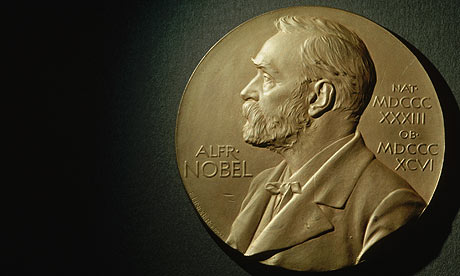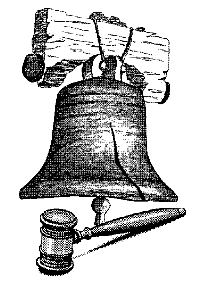 Elected officials and pundits from all corners of the political landscape sounded off on the surprise selection of President Obama as the recipient of the 2009 Nobel Peace Prize. Unfortunately (but not unexpectedly) the traditionally prestigious and respected announcement has been met with somewhat childish partisan bickering. Traditionally liberal news outlets trumpeted strikingly different headlines than conservative programs, and both Republicans and Democrats immediately set upon one another in what has become a rather embarrassing display.
Elected officials and pundits from all corners of the political landscape sounded off on the surprise selection of President Obama as the recipient of the 2009 Nobel Peace Prize. Unfortunately (but not unexpectedly) the traditionally prestigious and respected announcement has been met with somewhat childish partisan bickering. Traditionally liberal news outlets trumpeted strikingly different headlines than conservative programs, and both Republicans and Democrats immediately set upon one another in what has become a rather embarrassing display.On the liberal side, the DNC is perhaps most deserving of criticism for its shocking assertion that "the Republican Party has thrown in its lot with the terrorists" by criticizing the award. While it is true that many conservatives have reacted in remarkably distasteful ways, this allegation is simply over the top. It is interesting to note that such hyperbole is subject to the same criticism often levelled by the DNC itself against the Bush Administration. Specifically, it echoes the tired (and often misleading) mantra of "you're either for us or against us" to which many Democrats objected as an example of "fear-mongering." Dissent from the dominant view has a long and rather proud tradition in American politics, and it is unfair to conflate the interests of terrorists and the Republican party purely on the basis of their reaction to the selection of a Nobel Prize winner. Furthermore, it is inappropriate and ingenuous to employ the same tactics utilized by Republicans, which the DNC previously found so objectionable.
For conservatives, the most deplorable response has undoubtedly come from Rush Limbaugh. Interestingly, Limbaugh's comments had almost no bearing on the issue of selection itself. Rather, Limbaugh's remarks devolved into almost fanatical ravings about topics that were only tangentially related to the issue at hand. Even this was eclipsed, however, by his offensive portrait of the appropriate fundamental character of the United States. Limbaugh describes the awarding of the Nobel Peace Prize as an attempt to "emasculate the United States," saying "they [presumably the world] love a weakened, neutered U.S." Limbaugh's final (and oft quoted) determination is that it is a "greater embarrassment" than losing the Olympics to have one's President awarded the Prize.
The most salient point is perhaps Limbaugh's use of the word "emasculate." Typically, one reads this as "to deprive of strength or vigor; weaken," but his further emphasis on the attempt to "neuter" the U.S. implies that he means instead the rather literal interpretation of "castration." In this sense, the word is more often read as 'depriving one of one's masculinity.' Of course, this interpretation is immediately alarming because it seems to imply (1) that the United States should embrace only traditionally 'masculine' concepts and (2) that peace is not one of them. This reading is supported by the general gist of Limbaugh's rantings, which in essence complain of a diminution of the prestige or worth of the United States when it is prevented from pursuing a military objective.
Although it is perhaps too much to wish that Limbaugh would seriously consider the meaning and ramifications of his words before speaking them, it is imperative that American people take the time ponder the ideology that his remarks reinforce. For instance, why is it enervating or offensive for the United States to be viewed as a nation that values peace? Must an association with peace rather than war be viewed as an indication of weakness? Certainly it is an American tradition to fight for important principles such as freedom, individual rights, and equality -- but is this done for the purpose of the actual fighting or with an eye to the better state of affairs that (we hope) will exist after the day has been won?
One would assume that a peaceful world in which all are free to seek life, liberty, and the pursuit of their own happiness would be considered preferable to a world in which people must constantly struggle and die for the same. Limbaugh does not seem to share this assumption, which, of course, is his right. But if the people of the United States of America do not believe it, if the fight itself has become more important than what we are fighting for, then it seems that we must seriously reevalute the importance we attach to values that we claim to hold dear: fraternity, family, liberty, and equality. Peace is essential to the enjoyment of these values, for they are dependent on freedom from fear and coercion. It is difficult to see, then, how the selection of the President as the recipient of an international prize praising efforts to achieve peace somehow demeans the United States.
Finally, this post would be remiss if it failed to recognize those individuals who have admirably demonstrated the qualities of true statesmen. Most notable are Governor Tim Pawlenty and Senator John McCain. Though they likely do not agree with the committee's choice and were far from defending his selection, each showed laudable discipline in giving respectful congratulations to the President. They, at least, recognized that the Nobel Peach Prize -- regardless of one's political leanings -- is a great honor for the country as a whole.
Photo Source: http://www.guardian.co.uk/news/datablog/2009/oct/09/nobel-peace-prize-winners-barack-obama


Even though the Nobel Peace Prize is a great honor for The President and our country I'm not sure he was the best choice for the award. I feel that he hasn't really had the chance to earn it quite yet.
ReplyDelete